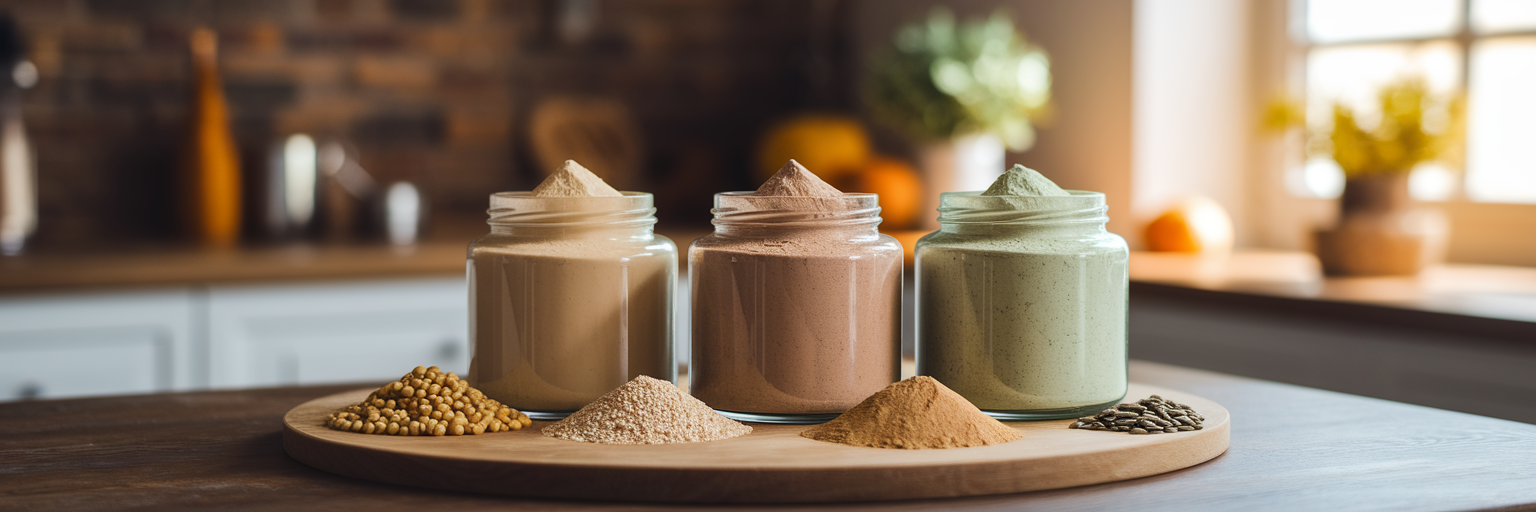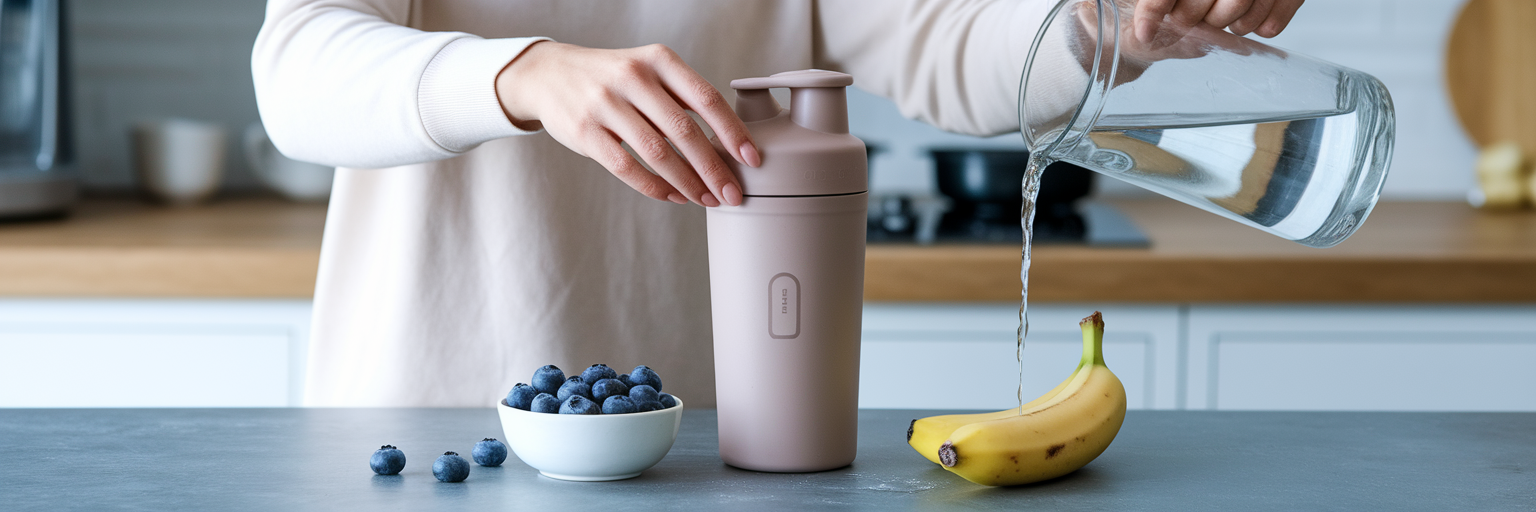Why Plant-Based Athletes Are Gaining an Edge
Let's be honest, you've probably wondered: Can I get as strong using plant protein as my friends do with whey? For years, the myth that serious muscle requires animal protein has lingered in locker rooms and online forums. But that idea is officially outdated. Today, a growing number of elite athletes are not just maintaining their strength on a plant-based diet, they're thriving.
The shift isn't just a trend. It's driven by huge advancements in food science. Modern vegan protein powders are no longer gritty, incomplete afterthoughts. They are sophisticated formulas designed specifically to fuel muscle repair and growth. These powders deliver the clean, powerful nutrition that serious weightlifters need to perform at their best.
This guide is your straightforward resource for navigating the world of plant-based supplements in 2025. We'll show you exactly what to look for in a powder to support your strength goals, so you can feel confident that you're giving your body everything it needs to get stronger, lift heavier, and recover faster. Your performance goals are completely achievable.
Understanding Plant Protein for Muscle Growth

Before you choose a protein powder, it helps to know what’s happening inside your muscles after a tough workout. It’s not as complicated as it sounds, and understanding the basics will make you a much smarter consumer.
The Science of Muscle Growth: Muscle Protein Synthesis (MPS)
Think of your muscles as a brick wall. After a heavy lifting session, that wall has tiny cracks and damage. Muscle Protein Synthesis, or MPS, is the construction crew that comes in to repair it. The protein you consume provides the "bricks," or amino acids, that this crew uses to not only fix the damage but also build the wall back stronger and bigger than before. This is how you build strength over time.
Complete Proteins and the Power of Blends
To do its job effectively, your construction crew needs a full set of tools, which are the nine essential amino acids (EAAs). A protein source that contains all nine is called a "complete protein." While many individual plant sources are missing one or two, modern science has solved this puzzle with blends. This is where the pea and rice protein blend benefits truly shine. Pea protein is high in certain amino acids that rice protein is lower in, and vice versa. Together, they create a complete and powerful amino acid profile that rivals traditional whey. For a broader look at how different supplements can support your athletic journey, you can explore some of the insights we've shared on our blog.
Leucine: The 'On Switch' for Muscle Building
Among the nine essential amino acids, three are known as Branched-Chain Amino Acids (BCAAs), and one of them, leucine, is the superstar. Leucine acts as the primary trigger or 'on switch' for that muscle-building process (MPS). Without enough leucine, the signal to start rebuilding is weak. When shopping, look for a high leucine vegan protein that provides around 2.5 to 3 grams per serving. This dose ensures you’re effectively flipping that switch and making the most of your post-workout nutrition.
Decoding the Label on Your Vegan Protein
With a solid understanding of the science, you can now confidently look at a protein powder label and know exactly what you're getting. It’s not about flashy marketing claims. It’s about finding a high-quality vegan protein powder for strength that delivers on its promises. As the expert panel at Garage Gym Reviews highlights, prioritizing powders with balanced amino acids and clean ingredients is key for supporting strength gains.
Here’s what to focus on:
- Protein Content: Aim for a powder that provides 20 to 25 grams of protein per serving. This is the effective dose needed to stimulate muscle repair and synthesis after a demanding training session. Anything less might not be enough to get the job done.
- Protein Source: Look for multi-source blends. A combination of pea, rice, and even pumpkin or sunflower seed protein ensures you get a robust and complete amino acid profile. Single-source powders can work, but blends are generally a more reliable choice for serious athletes.
- Beneficial Add-ins: Some of the best formulas include more than just protein. Added digestive enzymes like papain or bromelain can help your body absorb the protein more efficiently. For plant-based athletes, nutrients like iron, zinc, and vitamin B12 are also valuable additions for energy production and overall recovery.
- Third-Party Testing: This is non-negotiable for competitive athletes. Look for seals like NSF Certified for Sport or Informed-Sport on the label. These certifications guarantee two things: the product is free from banned substances, and what’s on the label is actually in the tub. It’s your assurance of safety and quality.
| Feature | What to Look For | Why It Matters for Strength |
|---|---|---|
| Protein per Serving | 20-25 grams | Provides the necessary building blocks to trigger muscle protein synthesis effectively after a workout. |
| Amino Acid Profile | A blend of sources (e.g., pea, rice, seed) | Ensures a complete profile with all nine essential amino acids for optimal muscle repair and growth. |
| Leucine Content | ~2.5-3 grams | Acts as the primary 'on switch' for muscle building, making your protein intake more effective. |
| Sweeteners | Natural sources (Stevia, Monk Fruit) | Avoids potential gut issues and blood sugar spikes from artificial sweeteners or cheap fillers. |
| Certifications | NSF Certified for Sport or Informed-Sport | Guarantees the product is free of banned substances and the label claims are accurate. |
Red Flags on the Vegan Protein Ingredient List

Just as important as knowing what to look for is knowing what to avoid. Some companies cut corners with cheap fillers and artificial ingredients that do nothing for your performance and can even hinder your progress. A transparent label is a sign of a brand that respects its customers.
Here are the red flags to watch out for:
- Excessive Fillers: Ingredients like maltodextrin are often added to bulk up a powder cheaply. While technically a carbohydrate, it can cause unwanted blood sugar spikes and offers no real nutritional benefit for strength goals.
- Artificial Sweeteners: Many people experience digestive discomfort from artificial sweeteners like sucralose and aspartame. Choosing a powder sweetened naturally with stevia or monk fruit is a much better choice for your long-term gut health.
- Proprietary Blends: If a label lists a "proprietary blend" without telling you how much of each protein source is included, be skeptical. A quality brand will be transparent about its formula so you know you're getting an effective dose of each ingredient.
- Lack of Contaminant Testing: There have been concerns in the past about heavy metals in some plant-based products. Reputable brands address this head-on by conducting third-party testing for contaminants and making those results available. A clean product, like our own chocolate vegan protein, is a great example of what to look for instead.
Optimizing Your Protein Intake for Peak Performance
Once you’ve chosen a quality powder, the next step is to use it strategically. It’s not just about chugging a shake right after your last rep. Integrating it into your daily nutrition is what truly supports consistent strength gains.
For years, everyone was obsessed with the "anabolic window," the idea that you had to get protein within 30 minutes of your workout. We now know it’s more flexible than that. While consuming protein within a couple of hours post-workout is still a great strategy to kickstart recovery, what matters most is your total daily protein intake. This is the single most critical factor when searching for the best vegan protein for muscle gain.
As a guideline, weightlifters should aim for 1.6 to 2.2 grams of protein per kilogram of body weight each day. A protein shake is an incredibly convenient way to help you hit that target. You can have it before a workout for sustained energy or after for repair—it really comes down to personal preference and what feels best for your body.
But don't limit yourself to just shakes. To keep your protein supply steady throughout the day, get creative. Mix a scoop of vanilla or chocolate protein powder into your morning oatmeal, blend it into a smoothie with fruit and spinach, or stir it into plant-based yogurt for a high-protein snack. For some inspiration, we've put together a few easy vegan protein recipes you'll actually crave.
Making Your Final Vegan Protein Choice
You're now equipped with the knowledge to choose a fantastic plant based protein for weightlifters. It comes down to finding a product that checks all the right boxes and fits seamlessly into your routine. Consistency is what drives results, so finding a powder you genuinely enjoy is important.
Here’s a final checklist to guide your decision:
- A multi-source protein blend (like pea and rice).
- 20–25 grams of protein per serving.
- A high leucine content (around 2.5-3g).
- Clean ingredients with no artificial sweeteners or fillers.
- Third-party certification for safety and purity.
Of course, factors like taste, texture, and how well it mixes will also influence your final choice. Don't be afraid to look for sample sizes to try a few options before committing to a large tub. If you're ready to find a powder that meets these standards, you can explore our collection of high-quality options.
We'd love to hear your thoughts—what are some of the top vegan protein powders US athletes are using? Share this guide with a friend or drop a comment below with your favorite!



